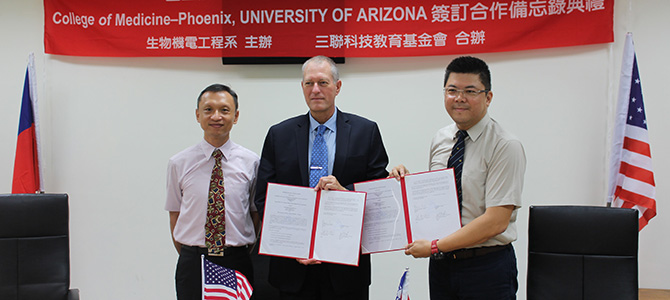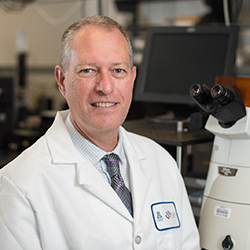
ANBM Strikes Alliance with Taiwan University

The University of Arizona is opening an innovation laboratory in Taiwan to take advantage of the nascent Internet of Medical Things.
UA’s Center for Applied NanoBioscience and Medicine at the College of Medicine – Phoenix signed a Memorandum of Understanding with the National Pingtung University of Science and Technology to establish a Taiwan-Arizona Partnership and Innovation Satellite (TAPIS) framework that’s expected to develop technology in global health engineering.

Fitbits that record activity and apps like Diabetes Tracker that measure a person’s glucose level are just scratching the surface of how medical devices can be used in health care.
Frederic Zenhausern, PhD, MBA, professor and director of the Center for Applied NanoBioscience and Medicine at the UA College of Medicine – Phoenix, said new applications will emerge as mobile health devices converge to provide real-time monitoring of health conditions, early detection of diseases using biomarker-based diagnostic tools and machine-learning algorithms for more efficient and precise health care delivery.
“TAPIS is an international research framework in collaboration with academic and commercial organizations that will design digital and wearable biomedical devices and prototype IoMT solutions for global health and remote medicine,” Dr. Zenhausern said.
Early detection is one of the trends in personalized medicine, so it is critical to provide patients with new means for them to monitor their own diseases or treatments more effectively and at a lower cost, he said. But new products must be delivered that are user-friendly, connected to the Internet, safe and readily accessible by health care providers.
Personalized medicine also means that researchers are exploiting biological processes to better target medical treatment and reduce risks of drug toxicity.
“The convergence of biotechnology, information technology and nanotechnology is the engine of the molecular revolution,” Dr. Zenhausern said. “It also is transforming on-demand health logistics and smarter drug manufacturing processes.”
TAPIS will consist of a network of inter-connected, international multi-disciplinary teams of investigators and industry experts that will work on projects focused on the combination of molecular assays development, sample preparation microfluidics, advanced sensing and detection technologies, 3D-printing for device prototyping and data analytics software systems.
The manufacturing of these distributed communication and smart devices often requires new methods of thinking. As explained by UA President Robert C. Robbins, MD, the UA is embarking on the fourth industrial revolution. The Arizona-Taiwan initiative is an example of the broad-based innovation that is essential to the economic growth and societal impact in Arizona and beyond, Dr. Zenhausern said.
National Pingtung University’s expertise is in mechanical engineering, microfluidics and remote sensing, while the Center for Applied Nanobioscience and Medicine’s expertise is in electronics, molecular biology and device manufacturing.
Media Contact:
Marian Frank
Phone: 602-827-2022
About the College
Founded in 2007, the University of Arizona College of Medicine – Phoenix inspires and trains exemplary physicians, scientists and leaders to advance its core missions in education, research, clinical care and service to communities across Arizona. The college’s strength lies in our collaborations and partnerships with clinical affiliates, community organizations and industry sponsors. With our primary affiliate, Banner Health, we are recognized as the premier academic medical center in Phoenix. As an anchor institution of the Phoenix Bioscience Core, the college is home to signature research programs in neurosciences, cardiopulmonary diseases, immunology, informatics and metabolism. These focus areas uniquely position us to drive biomedical research and bolster economic development in the region.
As an urban institution with strong roots in rural and tribal health, the college has graduated more than 1,000 physicians and matriculates 130 students each year. Greater than 60% of matriculating students are from Arizona and many continue training at our GME sponsored residency programs, ultimately pursuing local academic and community-based opportunities. While our traditional four-year program continues to thrive, we will launch our recently approved accelerated three-year medical student curriculum with exclusive focus on primary care. This program is designed to further enhance workforce retention needs across Arizona.
The college has embarked on our strategic plan for 2025 to 2030. Learn more.